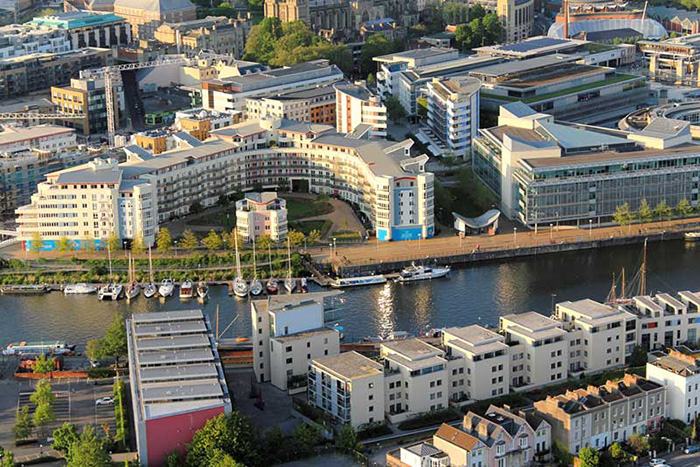How Bristol is Driving Innovative Tech Growth
Bristol’s burgeoning tech industry unsurprisingly earned the city its reputation as one of the top technology hubs in the UK.
In fact, the city is leading the way in the country’s digital tech ecosystem, as it now has the highest turnover per worker (£269,000 on average) for the second year in a row—outranking Reading (£247,000) and London (£200,000).
On top of that, Bristol emerged as the UK’s top smart city, thanks to a successful collaboration among its private companies, local government, and its citizens to improve the city’s public services and urban environment.
All these are huge contributions to the country’s technology sector, which is growing at “twice the rate of the wider economy.” Despite the economic and political consequences of the Brexit vote, the UK is still the digital capital of Europe.

Bristol’s Innovative Tech Growth
Although larger firms play their part in the local economy, start-ups in various industries continue to make their presence known in the city.
As further proof of how the city continues to push the envelope of tech growth, Bristol recently ranked 12th in European cities with the highest amount of tech investment.
The great thing about it all is that Bristol’s accolades are not just felt at a macro level. Citizens rate their life satisfaction at 7.45 out of a 10-point scale, with 92% of local start-ups in agreement.
Last month, we wrote an article on Bristol’s aspirations to become a smart city, and its current successes in adapting its infrastructure to become so. In this article, we want to look at how Bristol is pushing its tech industry forward in every aspect.
So, how is Bristol driving innovative tech growth?
Smart city investments
Beating out London to be the country’s leading smart city means that Bristol’s strategic initiatives and projects—from its IT, transportation, to healthcare sectors— have successfully transformed the lives of its citizens for the better in a multitude of ways.
Among its recent notable investments are:
- Indoor mapping technology – Living Map, a digital map and data platform, received two grants worth £125,000 to build an indoor mapping technology app that will help users find their way inside complex buildings (e.g. airports, museums).
- Ultra-low emission vehicles – The University of Bath received an additional £10 million, on top of its initial capital investment of £28.9 million, for the construction of the Institute for Advanced Automotive Propulsion Systems (IAAP). The IAAP is set to open in 2020 and will lead the development of ultra-low emission vehicles.
- Perform Green’s projects – Credited as one of the prime movers in turning Bristol into a better smart city, Perform Green is at the helm of two projects for the Bristol City Council.
- Bristol’s Smart Operations Centre, which manages the city’s traffic control, CCTV, telecare, and incident management services.
- Bristol Is Open, which allows for large-scale R&D for testing of future technologies.
Support for Bristol’s tech initiatives
Funding is a vital part of a company, especially for start-up owners who intend to scale their businesses. Bristol has plenty of initiatives to help tech companies grow, including:
- The Engine Shed’s ecosystem map – Engine Shed—a collaborative effort of Bristol City Council, the University of Bristol, and West of England Local Enterprise Partnership—launched a scale-up map where early-stage companies can find support near their area.
- Crowd10 – A Crowd10 campaign to help companies to get crowdfunding for growth capital, providing the platform for start-ups to pitch to almost 400,000 equity investors.
- Silicon Gorge – Partnering with local Southwest organisations, Silicon Gorge holds annual pitching competitions for early-stage tech start-ups for investments anywhere between £100,000 and £2 million.
- Oracle – As the “next-generation acceleration initiative,” Oracle provides mentoring, advising, co-working space, infrastructure, and a network of investors to help start-ups build their businesses.
Financial investments in tech programmes
Almost 70% of UK’s tech investment came from regions outside of London. Bristol & Bath, in particular, attracted £109 million in digital tech investment. The notable investments last year include:
- Quantum Technologies Innovation Centre – To contribute to the growing research on quantum field, The University of Bristol is investing £43 million to build the world’s first Quantum Technologies Innovation Centre. This open access centre aims to take quantum lab research products and push them out to the business world.
- Temple Quarter Campus – To make use of an otherwise derelict site on campus, The University of Bristol will also invest £300 million to build its Temple Quarter Campus (TQC). The TQC will provide research and teaching facilities, student accommodation, and commercial outlets. Facilities are said to be open for public use.
- CubeSat Programme – Backed by US aerospace giant Boeing and with the help of NASA, The University of Bristol will start developing satellites using a laboratory infrastructure called The CubeSat flatsat.
Ground-breaking tech companies
Despite the uncertain future for start-ups post-Brexit, innovation still runs high in Bristol’s tech industry. With a number of Bristol-based tech start-ups achieving prominence through innovation.
- Graphcore – With a total of £84 million investment, Graphcore developed chips aimed to lower the cost of accelerating AI apps. These chips are designed to power consumer devices and driverless cars and are set to ship in the first half of 2018.
- Rusty Squid – Designed as a social experiment. Rusty Squid made a documentary that follows their robotaround the city, with the intent to help people realise that robots are not going to spell humankind’s apocalypse. Rather, they are made to be a cultural phenomenon. Picked up by Channel 4, the documentary showed how the robot made friends with passers-by, raising philosophical discussions on the true purpose of this technology.
- Kudan – Aimed to provide a more accurate positioning than the regular GPS, Kudan developed the Simultaneous Location and Mapping (SLAM) technology. SLAM enhances existing Apple and Google AR tech just by using people’s smartphone camera.
- Ultrahaptics – By using ultrasound waves, Ultrahaptics was able to develop a technology that will let a user interact with a virtual world just by using their hands. The company recently signed a deal with gaming giant IGT to create multi-sensory gaming experiences.
Push for diversity
According to Councillor Asher Craig, the city’s deputy mayor, Bristol’s tech industry is being held back by its lack of diversity, both in gender and ethnicity. She added that the industry should be as diverse as its potential customer base.
Various organisations are pushing for more diversity in the workplace including:
- Gender diversity – With women accounting for only 17% of total tech workers, there is a severe gender inequality within the technology sector. Start-up Structur3dpeople, for one, started the #GettingMoreWomenIntoTech social media campaign. Meanwhile, The Dot Project held a conference last October to discuss ways to improve gender diversity in local areas. Not-for-profit organisation Women’s Tech Hub also held a conference early last year to introduce women to the tech industry.
- Ethnic diversity – Stepping Up, a new programme that launched in January, is at the forefront of improving the representation of Black, Asian, and Minority Ethnic (BAME) people in Bristol businesses.
All Aboard Bristol's Digital Revolution Train
The digital revolution is gaining more and more momentum in Bristol as the years pass. Meeting the nationwide bleak economic outlook, with a resilience measured by the continuous outpour of investments, a steady stream of innovations, and available talent pool.
With the digital landscape constantly changing, don’t let your business get left behind. If you need a professional and reliable IT team, we would love to help you out and make sure your company stays competitive in this economy. Send us an email or contact us via 0345 880 4554 / 0117 258 1300.







